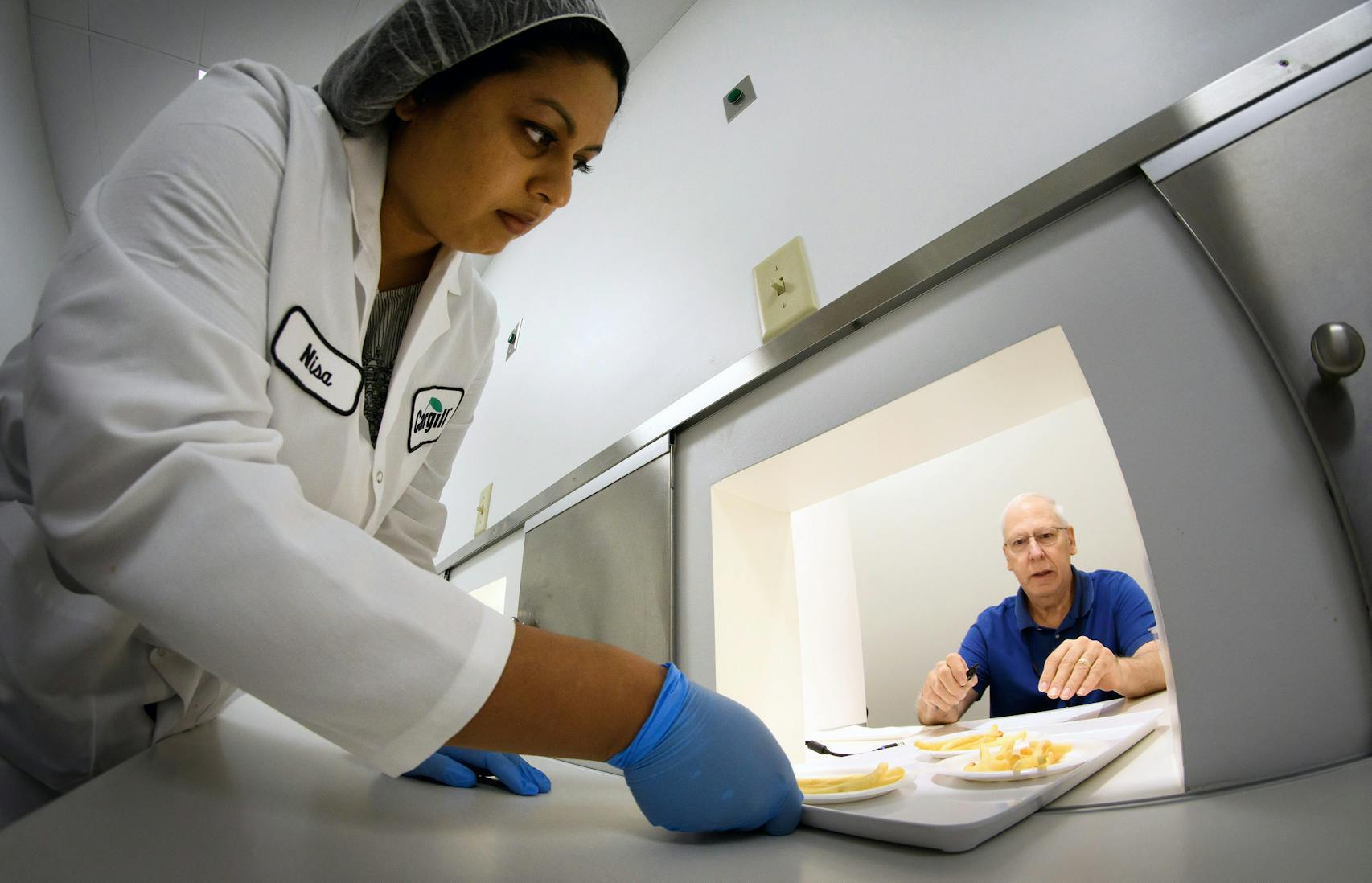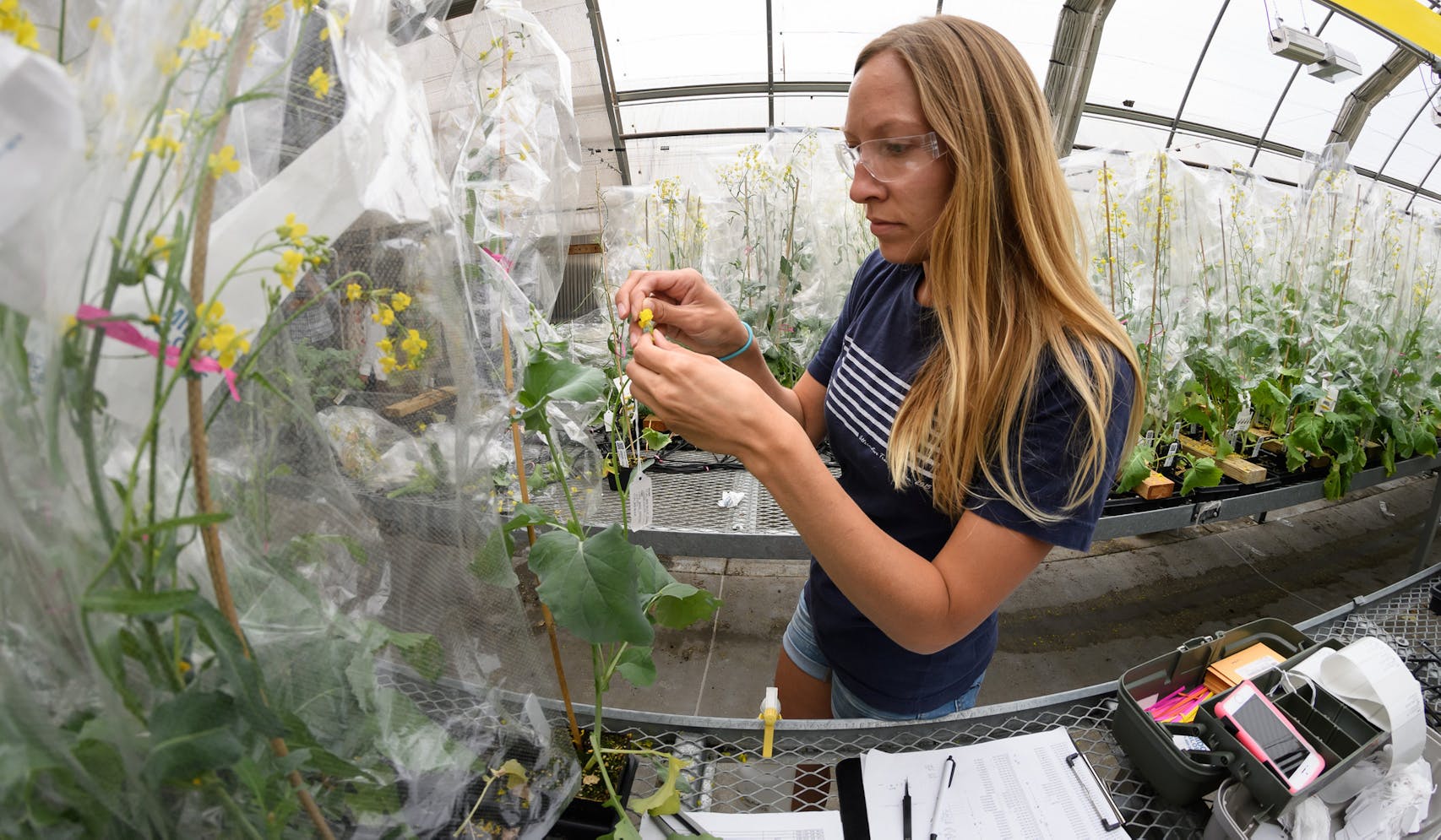A better French fry,
but will consumers buy it?
Many shoppers fear GMOs; scientists call it innovation.
FORT COLLINS, COLO.
Rich Fletcher spent 11 years tinkering with the genetics of the canola plant in pursuit of a single goal: Lowering the fat content of the oil it produces, one of the most widely used food additives in the world.
He succeeded. His employer, Cargill Inc., will begin selling the new, healthier oil to food companies around the world as soon as next month. Thanks to Fletcher and his team of scientists, those companies will be able to sell healthier French fries, cookies and thousands of other food items.
But a lot of people will refuse to buy those products.
Cargill's breakthrough included altering the genetic code of the new canola plant to withstand weed killers that growers might use in their fields. That makes the oil it produces a genetically modified organism, or GMO, something a growing number of consumers fear and that governments in some parts of the world outlaw.
"Food is as divisive as politics now. I even experience that in my family," Fletcher said. "I have some people who may perceive these improvements we've made as nonnatural. But, in the end, these kinds of innovations have gotten us to where we've never been."
Fear of GMOs is perhaps the clearest indicator of the skepticism that consumers have about the role science can play in improving the environmental quality, diversity and sustainability of agriculture.
Minnetonka-based Cargill and other big food companies argue that advances in the lab can play a critical role in increasing food production without depleting soil, water and other resources. Most of the United States' corn and soy beans are genetically engineered, for example, and the National Academy of Sciences and other independent groups have said GMOs are safe to eat.
Consumers are more wary. They fear developments like GMOs could cause unforeseen health risks, or increase the reliance on pesticides and herbicides. In 2016, some 43 percent of American consumers told the Hartman Group, a food research firm, that they were trying to avoid food that contained GMOs, up from 29 percent in 2010.
"Broadly, consumers want science out of their food," said Laurie Demeritt, Hartman's chief executive. Ideally, she said, they want to eat foods that their ancestors ate 200 years ago and that have never touched a production line.
This shift explains the surge in popularity of everything from farmers markets to the clean-label movement, which pushes against ingredients with scientific names, whether artificial or not.
"The longer the ingredients, the less I want to eat it," said Bethany Schrock, a 22-year-old Minneapolis resident.
Schrock weighs a variety of factors when grocery shopping. When it comes to premium products, she prioritizes organic and local foods above other labels that tend to raise an item's price. She doesn't go out of her way to buy non-GMO foods, but if given the choice between the two, will grab the one made without genetically modified ingredients.
Her husband, 23-year-old Wes Schrock, is more interested in convenience than his wife, but shares her concerns about some things.
"I don't know anything about this stuff," he said, "except GMOs are bad and there are a lot of different names for sugar."
A way to stand out
Consumers might associate Cargill with grain trading or beef processing, but the largest privately owned company in the U.S. is also one of the leading global suppliers of palm oil, starch and vegetable oils to the world's biggest food companies.
A new, healthier canola oil would help Cargill distinguish its oil from competitors also vying for the business of food makers.
For the first six years of their project, scientist Fletcher, 41, colleague Kristin Monser-Gray and a team of several dozen Cargill workers in Fort Collins searched for the genes that would lower the saturated fat of the canola plant's oil while also maintaining its durability in the field.
Their techniques were straightforward and painstaking: Manually pollinate one parent plant with the other parent plant using a tiny tweezer-like forceps. It took dozens of attempts before finding the right match.
For two years, they tested each of the most promising combinations in their Colorado greenhouses. For three years, they tested the best combinations in fields in Idaho and Canada.
"Those first few field trials, the plants looked terrible," Fletcher said. "I've never really experienced this type of emotional attachment to a product before."
Meanwhile, food scientists in Plymouth spent the past three years running a battery of tests on the new oil to make sure it improved the quality, taste and stability of the food products in which it is used. Modifying the genetic code to ensure that the canola plants could withstand herbicides was essential to making the plants appealing to farmers.
Once Cargill starts selling the new canola oil, food makers will be able to use it to lower the saturated fat content of products such as croutons, crackers and dairy creamers.
Monser-Gray acknowledged that it's sometimes difficult to explain Cargill's work and why it's important.
"We feel the disconnect. In science, it has to be logic driven," she said. "So figuring out how to engage in that conversation where it is an emotional argument, and how to bring the science to that."
Battle for trust
Most consumers aren't even sure exactly what GMOs are, but they don't like the sound of them.
The biggest reason Americans give for avoiding GMOs is concern about their personal health and well-being, a Hartman Group survey found, but few of them point to a tangible, specific health concern.
SAYING NO TO GMOs
According to a recent survey of consumers, here are the most common reasons consumers say that they "deliberately avoid or reduce the amount of genetically modified food in their daily diet."
Possible impact on healthWant to know what's in the foodDon't support companies using GMOsPossible impact on environmentDon't know enough about GMOsConcerned about plant biodiversity66%43%36%30%27%21%Sources: Organic and Natural Report, The Hartman Group"Even though there is growing GMO avoidance," Demeritt said, "there are not a lot of specifics given."
Schrock can relate. She trusts local and organic foods, but doesn't necessarily know why she avoids GMOs when given the choice.
McKay Jenkins, author of "Food Fight: GMOs and the Future of the American Diet," said the problem with GMOs is not necessarily the product itself, but what it enables. Genetic modifications that make crops tolerant of herbicides and pesticides allow for greater use of such chemicals.
Anti-GMO activists seized on a study published last year that showed that farmers growing GMO soybeans, bred to tolerate popular herbicides like Roundup, used more weedkiller than non-GMO farmers. That's because weeds developed a resistance to the herbicide, said one of the study's co-authors, Edward Perry of Kansas State University.
This plays into a deeper debate about industrialized farming practices, and whether agriculture should be moving in a different direction to sustain the soil and other natural resources. Some see monoculture, the cultivation of a single crop on the same field year after year, as a particular problem.
"The GMO thing is a big, loud, noisy thing that is one tiny part of a much deeper problem that we are really unprepared as a nation to address," Jenkins said. "We have to figure out how to create grain that is not chemically dependent, not going to deplete the soil or water supply."
Another issue is general distrust. When biotechnology started gaining traction in the food industry in the 1980s and 1990s, Jenkins said, the federal government in large part allowed industry leaders such as Monsanto to self-regulate by determining whether genetically modified products were safe.
"There is a deep, cultural anxiety about whether the government and companies are trustworthy," Jenkins said. "If you don't know where your food comes from, it will allow you to create all kinds of conspiracy theories at the drop of a hat."
Balancing tensions
Companies like Cargill are wedged between the dueling demands of farmers and consumers.
On one side it sells seeds to farmers, many of whom like the genetically modified products that have made their jobs easier. In the case of the canola plants, North American farmers wouldn't be interested in the new product without the herbicide-resistance trait, said Cargill's Lorin DeBonte, assistant vice president of research and development in global edible oils.
The quest for a healthier canola oil
Cargill spent 11 years finding the right genetics to reduce the amount of saturated fat in canola oil, and then put it into production.
DISCOVERY2006-11 After the discovery of saturated- fat-reducing genes, the search for the right plant begins. Hundreds of versions of the canola plant were grown.GENETICS2011 Experimental canola plant trials begin in greenhouses. A combination of genes that results in the healthier oil is field-tested in Canada.TESTING2012-14 The oil is tested for cooking and taste in Plymouth. Introduction of genetically modified herbicide tolerance.PRODUCTION2015-16 Growing enough canola plants to produce oil on a commercial scale takes two growing seasons.DISTRIBUTION2017 The first season of commercial production was this year.Source: CargillBut Cargill is also often buying crops such as corn, soybeans and wheat that it sells to food makers that are trying to supply products that consumers will embrace. The customers for the canola oil are likely to include fast food chains that are looking for a healthier way to fry menu items.
Today, the company sometimes produces products like the canola oil on two tracks. For the large U.S. market, it includes the bioengineered traits that farmers want and that consumers have thus far accepted.
But it can also sell a version without the herbicide resistance in Europe and other areas that have banned genetically modified crops.
DeBonte said Cargill knows there is growing consumer demand in North America for non-GMO products. He suspects the day will come when the non-GMO version of the canola plant is grown here as well, but couldn't say when.
Cargill's chief executive David MacLennan said the company has to face this tension every day.
"A lot of people who want sustainable food are also against GMOs, and that's fine," MacLennan said. "But the world needs GMOs at some level in order to produce food at [a large] scale."
Demeritt, of the Hartman Group, said mainstream shoppers still love and trust many of the famous brands on grocery store shelves. That will help them as consumers raise more questions about industrial and scientific methods in food production.
Consumers, she said, want to be told the story of their food and know that there was care put into it.
"What we are seeing is consumer interest and passion in knowing more about where food comes from," she said.
Fletcher believes that consumers ultimately will accept the canola oil that he has devoted much of his professional life to developing. Cargill has invested hundreds of millions of dollars to create the new supply line in the belief that they will.
"I think, in the end," Fletcher said, "we've created a healthier oil, and that will overcome any of the current public perception concerns."
Kristen.Painter@startribune.com 612-673-4767Glen.Stubbe@startribune.com 612-210-8603



